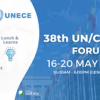News
Displaying Results 51 - 64 of 64
July is a month to start enjoying the harvest of fruits and vegetables for many in Europe and the topic of reducing food loss and waste becomes very urgent. In Serbia, agriculture is an important sector of the economy, contributing around 6% of GDP. In March 2022 food production accounted for 10.4…
In view of the upcoming COP 27 of the UNFCCC, taking place in Egypt later this year, the growing threats on climate created by the textile and leather sectors call for our urgent action. If we continue down this path, we will fail by 50% to meet our 2030 emissions reduction targets, resulting in…
UNECE was engaged at the main global forum to assess and discuss progress in implementing the Sendai Framework for Disaster Risk Reduction (DRR) – the seventh session of the Global Platform for Disaster Risk Reduction (GP2022) held in Bali and online, 25-27 May 2022, fully embracing its theme: “…
Products today are integrating more and more advanced technologies and sustainability criteria into their design. Soft toys with computer chips, medical devices that can assist in operations and learn from past uses, repurposed plastic bottles assembled to form a new, different product… each pose…
Standards are an integral part of society and are present in nearly everything that surrounds us on a daily basis; they shape how products are designed, produced and used. They are in all products that cross borders and can play a key role to reduce technical barriers to trade as well as integrate…
Recent disruptions of supply chains have exposed fragilities in the current trading system and brought to light the importance of resilience and transparency in global trade.
UNECE and other international organizations play a crucial role in supporting countries (including both the public and…
As an established convenor of standards developing organisations, UNECE encourages the integration of a gender perspective, providing practical steps for organisations to advance women’s full and effective participation in standards and standards development. With the objective of strengthening…
The textile industry is a key driver of Uzbekistan’s economy, reflected in the country’s rank as sixth largest cotton producer in the world. In 2021, the country accelerated the battle against its child and forced labor violations in cotton harvest according to a new International Labour…
As supply chains within the garment and footwear sector are becoming increasingly complex, the need for transparency is more relevant than ever. Consumers, investors and shareholders are pressing for transparent business activities as well as the prevention and mitigation of risks in value chains,…
Global trade has been transformed repeatedly throughout history, driven by new business processes and new policies. The new advances in digitalization now promise further transformation by making it faster, more transparent, reducing risks of red tape and corruption. With the increase in global…
Over 60 participants worldwide joined the online roundtable organized by the UN Digital transformation group for Europe and Central Asia (DTG4ECA) in the framework of the Regional Forum on Sustainable Development for the UNECE region. Established in May 2020, DTG4ECA group, co-chaired by UNECE and…
We probably all know what a potato is and how we prefer to eat it. But do you know what a seed potato is, and why seed potato certification matters? And did you know UNECE has a standard for seed potatoes?
Potatoes is one of the easiest vegetables to grow, as old potatoes that have grown buds can…
Risk is a part of our everyday lives. When we wear a helmet to ride a bike, for example, we accept a small inconvenience to reduce the risk of a fall or an accident. When a homeowner decides to retrofit their house, they incur a cost to shield against an earthquake or a flood. Faced with the COVID…
Every year we lose about 14% of the food produced before it is sold, and this does not even include the food never harvested. Even more is wasted at retail and consumer levels. At the same time, over 800 million people worldwide suffer from hunger, while food loss is a major contributor to CO2…













